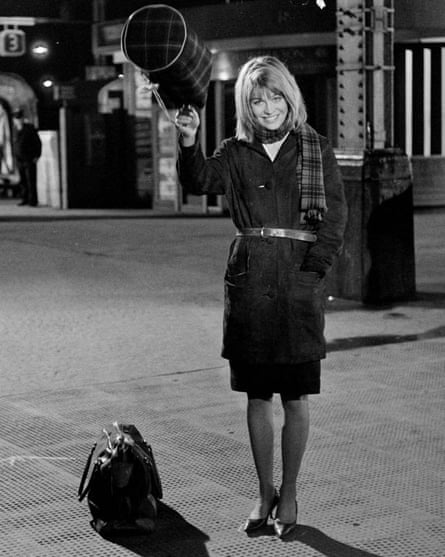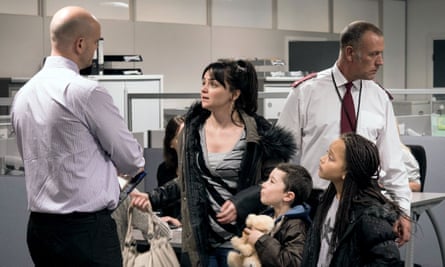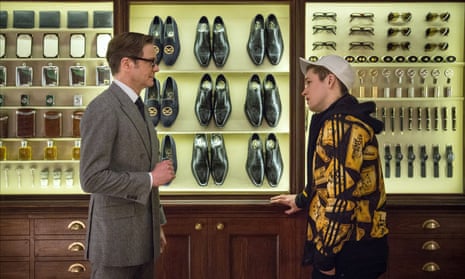Billy Liar always was a great night out. “A brand new kind of escapist entertainment,” the trailer blared when the film was released in 1963. But the escape it most literally concerned – one in which a northern funeral clerk might jump on a train and make it as a London scriptwriter – wasn’t then so far fetched. Adapted from his own novel by Keith Waterhouse, it arrived in a Britain giddy on the Beatles and grammar school upstarts like Billy. Social mobility brought the film to life. While director John Schlesinger was solidly Hampstead, Waterhouse was a dropout from Osmondthorpe Council School, Leeds, and star Tom Courtenay the son of a Hull dockworker. As the box office boomed, a daydreamer might have conjured up a British film industry filled with working-class actors and writers, maybe even directors and producers, too.
Of course – spoiler warning – Billy never caught the train. The apparent golden age of social mobility would quickly sputter out. And the idea of this class calling the shots in British cinema? Rarely more than fantasy. Now, the mood is darker. In 2018, it can be hard finding working-class talent exerting any influence in the creative space of British film.
Even the actors are vanishing. “We have got a big problem,” Equity president Maureen Beattie said recently of the lack of opportunities for working-class performers. Actors including Maxine Peake and Lesley Manville appeared at the BFI this spring to publicly highlight the crisis. Drama has been cut from the classroom, young actors priced out of training, a glum contest among those who remain for dwindling roles as gang members and sex workers.

But actors are just part of an ecosystem. They can only play roles created by writers for films made by directors. And the story of working- class screenwriters is another with a glorious future behind it – the postwar era that produced Waterhouse also witnessed the black precision of Harold Pinter and the singular vision of Shelagh Delaney, writer of A Taste of Honey, finder of wonder in back streets and bedsits. It’s worth pausing just to consider how unlikely it would now be for a major British film to be written by a young woman from Salford with no university education.
Class in 2018 is hard to define but harder to address. Even discussing the most straightforward socioeconomic measure – how closely an industry reflects the national baseline of 7% of the population attending private school – causes fluttering unease. Still, the scale of the problem can be glimpsed in the origins of five current directors who have scaled British cinema to win regular big-budget studio projects: Matthew Vaughn, Guy Ritchie, Tom Hooper, Sam Mendes and Christopher Nolan. All were privately educated. Parity in terms of class – let alone representation of women and people of colour – would require there were 66 other directors of a similar standing who went to state schools.
Feel free to start counting. Of course, British directors from working-class backgrounds make high‑profile films. Just not many – and these success stories tend to come with caveats. Danny Boyle made his first feature, Shallow Grave, nearly 25 years ago. Steve McQueen will open the London film festival in October with his much-anticipated thriller Widows, but his route from the London suburb of Hanwell to the red carpet came via the art world, which, like theatre, is more meritocratic than British film. And then there is Lynne Ramsay. For a director in a landscape of limited chances, the reward can be whispering campaigns. Ramsay, whose mother was a cleaner in Glasgow, acquired a reputation as difficult and volatile and all the other codewords used for working-class women who have an opinion. Her last film, the astonishing crime drama You Were Never Really Here, was wildly praised. It was also only her fourth feature film in nearly two decades.
Move through the ranks of the business – past the actors, writers and directors – and eventually you reach the producers, development executives, the heads of production companies and funding bodies. Here at last are the decision-makers who shape everything British you see on a cinema screen. Socio-economically, it is a group drawn from the same pool as so many of our MPs, lawyers and journalists.

It was ever thus and the 1960s didn’t change it. Legally, class is not a “protected characteristic” in the labour market – but then film is mostly lawless anyway, filled with opaque hiring practices and internships for those whose bills are paid by other means. From script readers up, the result has been a highly specialised gatekeeper class taking charge of endless safety-first development streams. Presented with working-class experiences, its members might just as well be listening to Finnish. The issue is not only people having a fair shot at the top jobs in British film; also at stake are the films that never get made.
A defining feature of the 60s working-class moment was youth – Delaney co-wrote the screenplay for A Taste of Honey at 22. The tradition endured: Ramsay was 29 when she made her first feature Ratcatcher, Shane Meadows 23 at the time of his, Small Time. Now, the industry’s risk aversion would slow any young film-maker – but the particular discomfort with these kinds of voices means an extra long spell in limbo. Director Deborah Haywood was 47 before she made her debut feature, this summer’s brilliantly off-kilter portrait of smalltown England, Pin Cushion. Colin O’Toole, winner of the 2018 Bafta for best British short with the tightly wound Cowboy Dave, is already 40 with a string of other shorts behind him. Meadows, by the way, effectively left British film in favour of TV 10 years ago.
While it felt reasonable to hope that iPhones and YouTube – or at least cheap cameras and Vimeo – would provide cinema with a new generation of ordinary hotshots, the reality has been patchy. Gifted young directors have appeared online, many either working class or dealing with working-class life – Cecile Emeke, Aaron Dunleavy, Kibwe Tavares, Emma Gilbertson. But a well‑signposted bridge has yet to open between online creativity (nimble, democratic) and British cinema (nervous, arthritic).
In 2018, class definitions are works in progress, old touchstones such as university degrees less meaningful, race and gender recognised as central. But to get lower-class characters on to a big screen, the safest bet remains being Ken Loach. Thank God for him – few directors have his heft, or could have made a film as vital as I, Daniel Blake. Things only get tricky when the industry sees Loach as a ticked box, apparently believing working-class people exist in a state of gritty social realism the way children think Victorians lived in black and white.
Loach has always been more subtle than that. But what are missing are emotionally complex films about people who just happen to work in call centres – one exception that proves the rule is Debbie Tucker Green’s Second Coming, about a working-class black family touched by metaphysics. Most working-class people are neither thugs nor saints but as mixed-up as the average executive – and the best films hold two thoughts at once. Billy Liar was an absurdist frolic with a brutal punchline; Ramsay’s eponymous Morvern Callar a blank young raver from a Scottish supermarket who became the heart of a shimmering Spanish road movie.

But it is hard to contain multitudes when working-class lives are treated as a niche. It also defies demographics. With class, the situation has never been one in which a small group of people have been shut out of British film; rather, a small group of people have shut themselves inside it. The consequences ripple through everything from the sniggery classism of Matthew Vaughn’s Kingsman movies to the British Board of Film Classification awarding a 15 certificate to the recent documentary A Northern Soul (too many “fucks” in the wrong accent) to the very cinemas in which prestige British films typically play, the expanding boutique chains Everyman, Picturehouse and Curzon.
Economically, short-term salvation lies in the middle-class pound that extends to wine and gourmet popcorn. But the exclusion of the young, skint and state educated from a mass market art form is a shame – and flatly suicidal in the age of Netflix. If the problem is vast, a mirror of the whole British class system, it is also deceptively simple. People like to see people like themselves on screen and be able to afford a ticket. The prize for the solution could be just as huge – a plausible future for a British industry now clinking glasses as the iceberg looms
